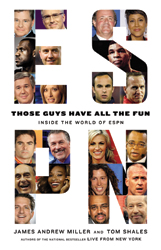I didn’t know that
Dick Ebersol interviewed to become president of
ESPN in 1979, after he lost his job as
NBC’s head of comedy, variety and specials.
I didn’t realize that ESPN2’s 1993 launch led to one of the craziest, drunken parties in the 32-year history of ESPN.
But dozens of stories like these make up the 745 pages of James Miller and Tom Shales’ much-anticipated book, “Those Guys Have All the Fun: Inside the World of ESPN,” which will be released this week.
From the book: ESPN vs. NBC over the NFL
[At the NFL’s Manhattan headquarters on April 14, 2005, Walt Disney Co. President and CEO] Bob Iger told the NFL guys that he had an offer for Monday night, but they didn’t want to hear about it, at least not then. “We’re not going to accept offers for Monday night,” [Denver Broncos owner Pat] Bowlen said. “You want to be in prime-time football, you have to be on Sunday night.” Iger said he didn’t want to do it that way, and proceeded to make a $1.5 billion offer: $1 billion for “Sunday Night Football” on ESPN, and $500 million for “Monday Night Football” on ABC. So much for ABC dumping “Monday Night Football.”
 |
Bowlen exploded. [New England Patriots owner Bob] Kraft was frustrated. They couldn’t believe Iger was now making a bid that Bowlen had practically begged him to make more than six months earlier. The NFL gang was so miffed, they left the room.
While Iger agonized, [NFL Chief Operating Officer Roger] Goodell called Dick Ebersol and asked how quickly he could get over there. Ebersol was at 280 Park Ave. in 20 minutes and was spirited up by a back elevator. The NFL negotiating team asked Ebersol if he was still willing to pay $600 million for Sunday night. Ebersol said yes, and the NFL guys said, “Congratulations, you have a new football night.”
Minutes later, Commissioner [Paul] Tagliabue told Iger and [George] Bodenheimer that Sunday night was no longer an option. … Iger had been told by at least one knowledgeable insider that NBC was in the bidding and had simply refused to believe it. Now he knew it was true, whether it made sense or not. Sunday night was gone, and only Monday night remained. And Iger knew what [the NFL’s Steve] Bornstein had known for close to two decades: he just couldn’t let ESPN go without football because it would brutally harm the brand, and more important, between 30 and 35 percent of its affiliate fees were from football. ESPN had to have football.
There would be no more ABC “Monday Night Football.” With almost no bargaining position, a situation aggravated by the fact that Bornstein knew from eons of experience how much ESPN could afford to spend, Disney had to bid up to $1.1 billion a year for eight years to place “Monday Night Football” on ESPN’s roster.
Ebersol: There’s no question that if ABC-ESPN had made the deal within two weeks of the time the other networks did, they would have held on to both packages, and I’d be shocked if they couldn’t have held on to it for, like, a million-four for both.
Iger: I was feeling good that we had secured an eight-year deal for sports television’s most venerable franchise when the other TV packages went for six years. I also felt good that we had clearly strengthened one of Disney’s core brands, ESPN, and had created a new opportunity for ABC on Monday nights.
Bornstein: I don’t want to sound smug. I was pleased with the end result of these negotiations. Essentially, the NFL got paid more money for less product. We created a new package, and we got another hour of prime-time television because NBC was going to program the seven-to-eight o’clock block promoting our sport.
Sean McManus: We thought the break-even number was $425 million, and NBC paid $600 million. You can ask them if they’re making or losing money on it, but I know what the economics are, and I know how many more playoff games [CBS has] and what our ratings are, and I know that we generate probably 30 percent more ratings points each year.
From “Those Guys Have All the Fun,” by James Andrew Miller and Tom Shales
The book is comprehensive, covering ESPN in great detail from its humble beginnings to its current brand as the Worldwide Leader in Sports. The parts of the book I found most fascinating, however, didn’t come from inside the world of ESPN. They come from outside, detailing how ESPN’s rivals and league partners view the sports media giant.
In particular, I was struck with the ferocity of ESPN’s rivalry with NBC. The book details a bitter multi-decade feud between ESPN and ABC Sports. Since ESPN shed the ABC Sports brand in 2006, it seems that NBC has stepped in to carry the mantle as ESPN’s most bitter rival.
In a quote that is certain to make the rounds in Bristol, Conn., this week, Ebersol tells Miller and Shales, “But there’s very little that they do anymore that’s much better than some local cable operation. That’s hard to believe with all the resources they have and the army of people and all that, but nobody seems to care. That’s what I mean when I say they lost their way in terms of quality and everything else.”
Sitting in a Manhattan café following ESPN’s upfront presentation last week, I asked Miller about that quote, and he said it reflects a real sense of competitiveness between the two sports media companies.
“NBC and ESPN are like the Bears and the Packers. They are like the Yankees and the Red Sox,” Miller said. “They are very, very competitive with each other.”
Miller believes a lot of that competitiveness stems from the fact that many of NBC’s top-flight producers and talent left ESPN and ABC Sports — many on less than good terms. Miller referenced people like Al Michaels, John Madden, Fred Gaudelli and Drew Esocoff. They have remained competitive with their former employer, and their former employer has remained competitive with them.
“Those are pretty important people who left,” he said, “and I think that contributes to some of the competitiveness.”
With NBC now overseeing Comcast’s cable sports channels, Versus and Golf Channel, the competition has become even more intense. ESPN and NBC fought over the rights to the NHL (which went to NBC) and the Pac-10 (which went to ESPN and Fox). Next month, they will be dueling for Olympic rights.
The intense competition also can be seen during the NFL season, when NBC and ESPN compete more than any other of the league’s network partners, due to the fact that they split the NFL’s two full-season prime-time packages.
While Fox and CBS also compete with ESPN, Miller says he doesn’t get the sense that their battles are as fierce as NBC’s.
“One of my favorite interviews for the book was [Fox Sports Chairman] David Hill,” Miller said. “His basic premise is that ESPN is zigging and Fox is zagging. ESPN doesn’t do what Fox does. Fox isn’t going to put football on at night, because that’s going to ruin a guaranteed revenue stream for them. But on Sunday afternoon, that’s fine, they’ll do it then. I don’t think he’s upset by ESPN because he thinks they do something different. They don’t have ESPN in their sights as much. I think NBC does.”
Miller said the leagues also are wary of ESPN’s propensity to market ESPN more than a league — something that was started during Mark Shapiro’s reign as head of programming.
“During the Shapiro years, Mark was such a fierce defender of ESPN’s brand that if the leagues didn’t like it, tough. So he had tough relationships with the leagues,” Miller said. “[John] Skipper is a kinder, softer leader. But I still think there’s some tension there.”
Miller also pointed out that because ESPN has more hours to fill than its broadcast competitors, it appears that it is thumping its chest more frequently than others.
“The leagues should thank them, I guess, in the sense that it gives them more exposure,” Miller said. “I don’t think the leagues see it that way. They see it as being used.”
John Ourand can be reached at jourand@sportsbusinessjournal.com. Follow him on Twitter @Ourand_SBJ.





